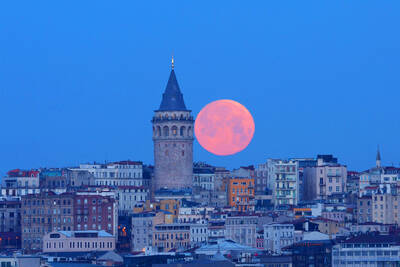Al-Qaeda’s North African branch claimed to have killed at least 130 people in Algeria in a spate of attacks this month — nearly twice the official death toll, said a statement carried on a Web site frequently used by militants.
The group described the attacks targeting a police academy, a military barracks and a Canadian engineering company this week as its retaliation against security forces for their recent crackdown on militants.
The militant group also denied Algerian government claims that it was targeting the general population, insisting that it only hit security forces, which it accused of being apostates or traitors to Islam.
The bombings “killed more than 130 apostates, wounded more than 100 and destroyed three barracks and several vehicles,” the militant group said in a statement carried late on Friday on a Web site often used by militants.
The statement could not be verified independently, but was also quoted by the US-based SITE group, which monitors extremist messages. In addition, it was similar to a statement issued by an al-Qaeda spokesman on the Arab TV station Al-Jazeera.
Official tallies show that up to 60 people were killed in the attacks carried out in less than 24 hours this week.
On Tuesday, a suicide bomber rammed a car full of explosives into a line of applicants waiting to register at a police academy, killing at least 43 in the town of Les Issers, some 55km east of the capital, Algiers.
At dawn the next day, twin car bombs targeted a military headquarters and a passenger bus in the neighboring town of Bouira, 90km southeast of Algiers. The 12 killed in Bouira were employees of a Canadian engineering company, SNC-Lavalin.
Security and hospital officials say another five people have since died of their injuries from the attacks.
This raises to at least 70 the number of people killed in the six large-scale attacks that took place this month.
Still, the official death toll remains much lower than the figures advanced by al-Qaeda’s statements, which also were based on claims that militants killed many more people than officially acknowledged.
Authorities insist terrorists indiscriminately target the Algerian population and often avoid updating official casualty tolls, especially for slain government forces.

ANGER: A video shared online showed residents in a neighborhood confronting the national security minister, attempting to drag her toward floodwaters Argentina’s port city of Bahia Blanca has been “destroyed” after being pummeled by a year’s worth of rain in a matter of hours, killing 13 and driving hundreds from their homes, authorities said on Saturday. Two young girls — reportedly aged four and one — were missing after possibly being swept away by floodwaters in the wake of Friday’s storm. The deluge left hospital rooms underwater, turned neighborhoods into islands and cut electricity to swaths of the city. Argentine Minister of National Security Patricia Bullrich said Bahia Blanca was “destroyed.” The death toll rose to 13 on Saturday, up from 10 on Friday, authorities

RARE EVENT: While some cultures have a negative view of eclipses, others see them as a chance to show how people can work together, a scientist said Stargazers across a swathe of the world marveled at a dramatic red “Blood Moon” during a rare total lunar eclipse in the early hours of yesterday morning. The celestial spectacle was visible in the Americas and Pacific and Atlantic oceans, as well as in the westernmost parts of Europe and Africa. The phenomenon happens when the sun, Earth and moon line up, causing our planet to cast a giant shadow across its satellite. But as the Earth’s shadow crept across the moon, it did not entirely blot out its white glow — instead the moon glowed a reddish color. This is because the

DEBT BREAK: Friedrich Merz has vowed to do ‘whatever it takes’ to free up more money for defense and infrastructure at a time of growing geopolitical uncertainty Germany’s likely next leader Friedrich Merz was set yesterday to defend his unprecedented plans to massively ramp up defense and infrastructure spending in the Bundestag as lawmakers begin debating the proposals. Merz unveiled the plans last week, vowing his center-right Christian Democratic Union (CDU)/Christian Social Union (CSU) bloc and the center-left Social Democratic Party (SPD) — in talks to form a coalition after last month’s elections — would quickly push them through before the end of the current legislature. Fraying Europe-US ties under US President Donald Trump have fueled calls for Germany, long dependent on the US security umbrella, to quickly

Local officials from Russia’s ruling party have caused controversy by presenting mothers of soldiers killed in Ukraine with gifts of meat grinders, an appliance widely used to describe Russia’s brutal tactics on the front line. The United Russia party in the northern Murmansk region posted photographs on social media showing officials smiling as they visited bereaved mothers with gifts of flowers and boxed meat grinders for International Women’s Day on Saturday, which is widely celebrated in Russia. The post included a message thanking the “dear moms” for their “strength of spirit and the love you put into bringing up your sons.” It